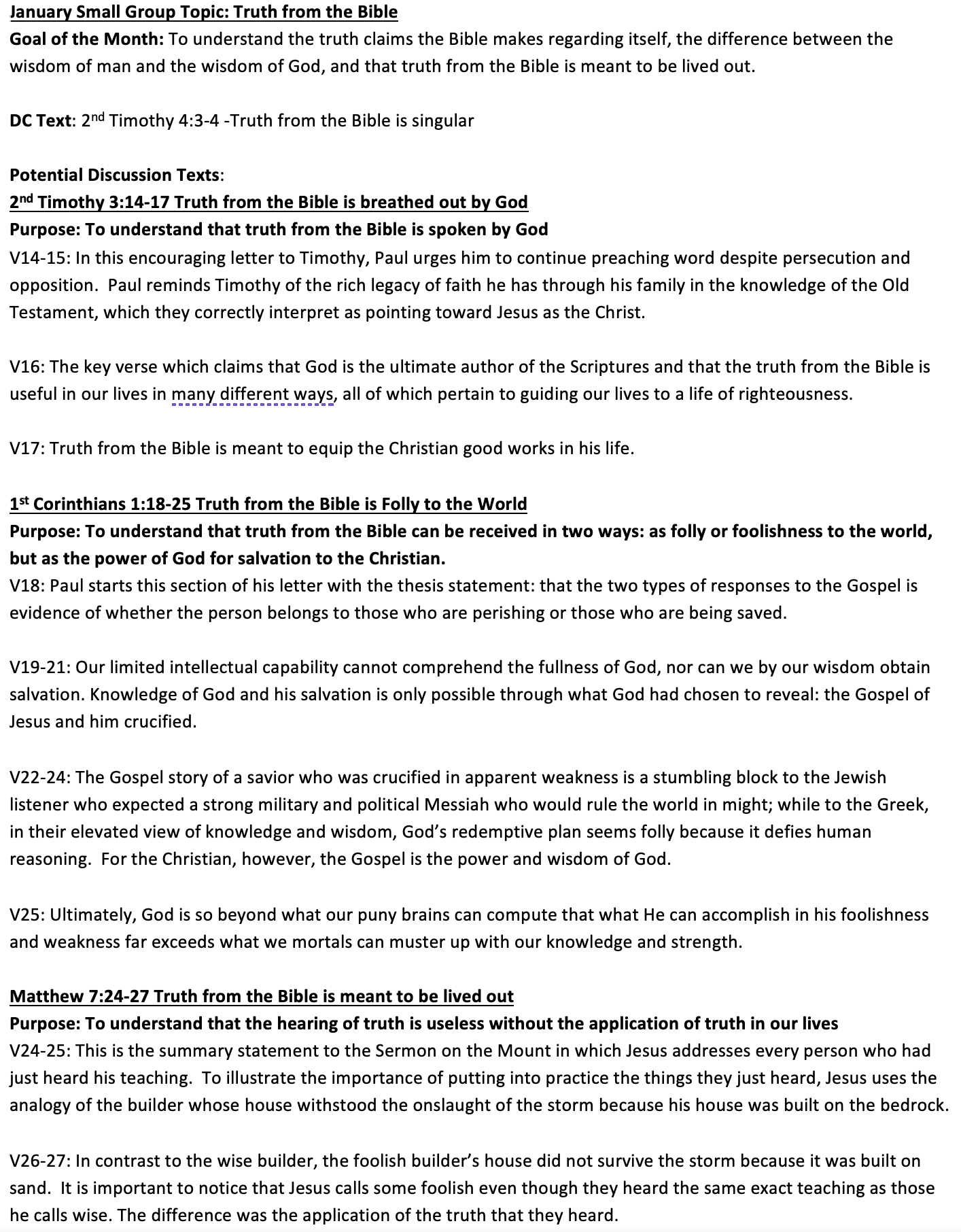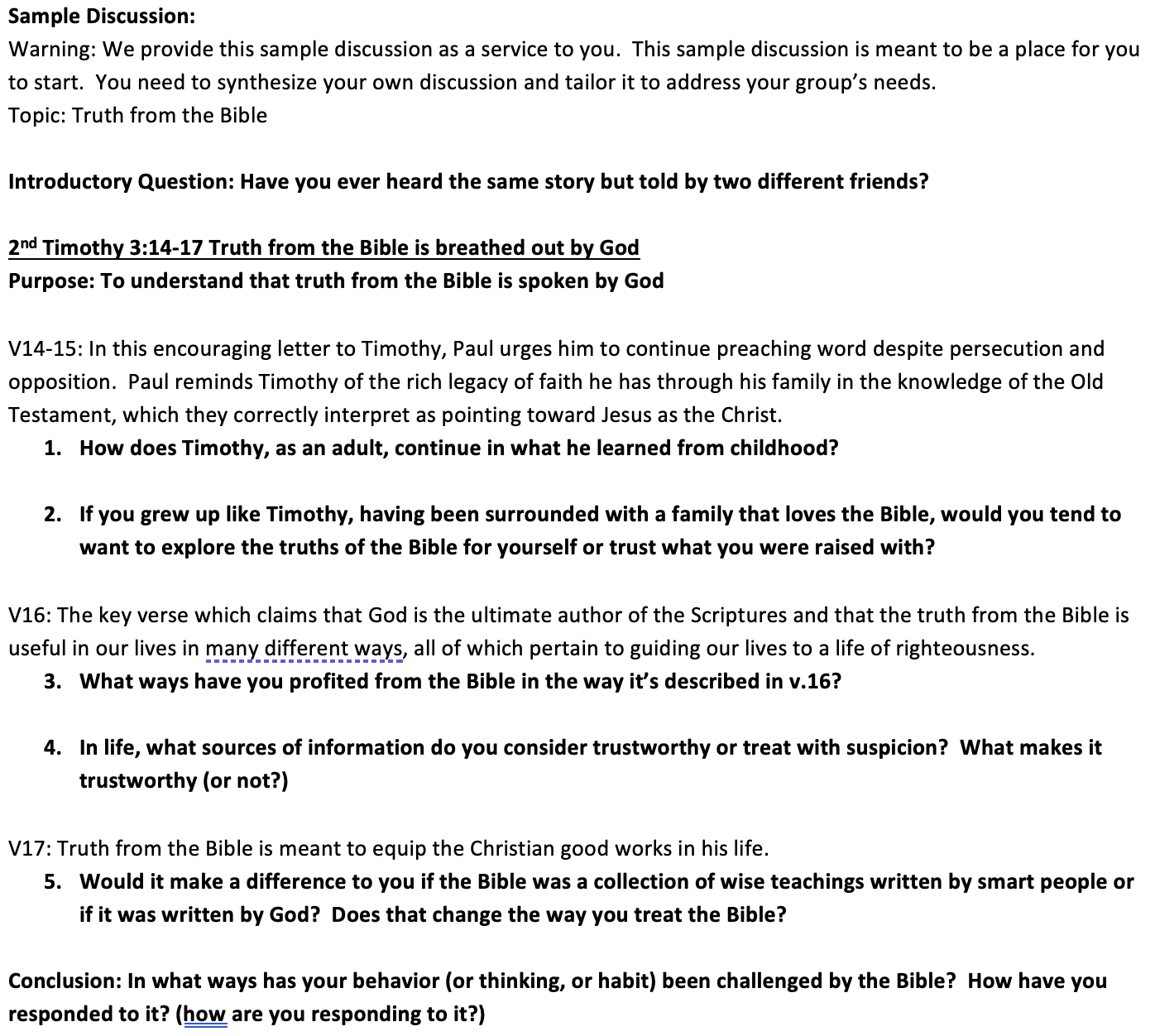Small Group Topics
Today, I have shared the complete set of Small Group Topics and Small Group Leader Notes, which you can see and read about on The Lighthouse. You should read the introduction there, first, and then come back here if you’re interested in my thoughts and observations.
Each month, one of these would be given to the small group leaders. I’ve included a screenshot of the first topic in the series (“Truth from the Bible” - note, it’s two pages, make sure to see the second one) just so that you can see what they look like.


Analysis
I wanted to provide some additional thoughts on the full set. It’s easy to get overwhelmed and lose the big picture.
This, the Series, and MBT, form the only teachings that all members in all churches in The Network will go through. While some Small Group Leaders (SGL) would go “off script” and pick a different topic, these were the standard topics that Small Group Leaders would use.
Remember: The Network has cycled through these topics since at least 2013, I can’t say before that. There may have been small changes along the way, as well, but generally speaking they do these topics on a two-year loop.
The List
By the Numbers
First, recall that leaders are to teach the “whole counsel of God.” (Acts 20:27). Joshua Church even quotes that on their Beliefs page: “We believe that true Christian unity only comes about by holding to the ‘whole counsel of God,’ rather than simply trying to find a few things upon which we can agree.”
Coverage of the Bible
I work in the software world and there’s a concept called “code coverage” in terms of testing - basically it measures what percentage of your code actually got hit as you tested it. Here, I use a similar concept to see how much of the Bible someone in The Network is actually getting to discuss.
96 topics (4 per topic, 24 topics)
29 books of the Bible (out of 66 - 44%)
17 of 27 in the New Testament (63%)
12 of 39 in the Old Testament (31%)
83 chapters referenced (of 1,189) (7%)
64 of 260 chapters in the New Testament (25%)
19 of 929 chapters in the Old Testament (2%)
810 verses referenced out of 31,102 (2.6%)
595 out of 7,957 in the New Testament (7.5%)
215 out fo 23,145 in the Old Testament (0.9%)
By Type
24 of the 96 passages are specifically about Jesus (25%)
19 of the 96 are from the Old Testament (20%)
The Good
Let’s start with some good things.
All four Gospels are present, and so is Acts, repeatedly.
Matthew - 10
Mark - 4
Luke - 4
John - 7
Acts - 11
The writings of Paul are the focus of 21 of the 96 passages (22%), so they’re at least not obviously falling into one of the biggest issues with Evangelicalism today which is to elevate Paul above Jesus.
Many of these passages are obviously important to talk about! My problem isn’t with what’s here (though there are a couple of misuses of passages I’ll call out) - my problem is that this is it. There’s nothing beyond this. Spiritual milk is all you will get, in contrast to Hebrews 5:11-14 which expresses disappointment with being stuck on the “basic principles” and having failed to become “teachers.”
About this we have much to say, and it is hard to explain, since you have become dull of hearing. For though by this time you ought to be teachers, you need someone to teach you again the basic principles of the oracles of God. You need milk, not solid food, for everyone who lives on milk is unskilled in the word of righteousness, since he is a child. But solid food is for the mature, for those who have their powers of discernment trained by constant practice to distinguish good from evil.
The author regrets that they cannot hear anything more advanced yet. Contrast this with the view of the network that it’s best to stay to the “main/plain/clear” doctrines.
Glaring Omissions
The biggest issue with a curriculum like this is that it leaves a lot out. Over 97% of verses in the Bible do not get discussed, ever. But what are those 97%?
Wisdom Literature
I find mixed answers as to which books of the Bible count as “wisdom” literature, and it may include Psalms (used in six topics). But the books of Proverbs, Ecclesiastes, Job, and The Song of Solomon are missing entirely. Proverbs here is a shocking omission, given that The Network claims to be all about doing “application of the Bible”, and that’s what Proverbs is all about. Proverbs actually says, “The beginning of wisdom is this: Get wisdom, and whatever you get, get insight.” (Proverbs 4:7). Ignoring the entire book seems quite foolish. I led my group in a month on Proverbs (I think - might have only been a week or two), and a few weeks on the “Proverbs 31 woman”, and both were amazing.
Minimal Torah
The first five books of the Bible, known as the Torah, or the Pentateuch, are referenced exactly three times, two of which are in the same month (“Dealing with Temptation”). These books describe creation, the formation of Israel, the ten commandments, the law, the Exodus, and so much more. They include classic stories like Jacob wrestling with God, Abraham getting called, the pride of the tower of Babel, and the entire life of Moses. Here are the only three references:
Topic: Dealing with Temptation
Gen 3:1-7: The Serpant, Adam, and Eve, in the garden, only up to the point where they realize they are naked. (This is the passage the DC pastor is supposed to teach)
Gen 39:1-20: Joseph and Potiphar’s wife - which completely misses the power dynamics at play. Potiphar’s wife has power to destroy Joseph’s life (as evidenced by the fact that she does exactly that when he rejects her). It looks a bit strange to us because the genders are backwards of what we typically imagine, but all current laws recognize this as what it is: this was sexual harassment, followed by an attempted sexual assault, not an attempted seduction. Imagine if a boss treated you the way Potiphar’s wife. Joseph’s refusal is commendable, but one should be careful about applying it too far. This passage has been used regularly to portray women as temptresses and argue for versions of the “Billy Graham Rule,” (men not being alone with women). It’s worth noting that no where does the Bible condemn Joseph for having been alone with Potiphar’s wife. I highly recommend this article: Women Are Not the Problem (thegospelcoalition.org)
Topic: Experiencing Small Group
Exodus 18:13-27: Jethro tells Moses to appoint delegates over smaller numbers, rather than hearing all disputes himself. The Network uses this to justify appointing small group leaders and DC pastors over smaller numbers. However, that’s not what actually happens in this passage. This passage isn’t about spiritual leadership, which is done by the priests. This passage is basically about a court system in which disputes are to be heard. Moses is trying to keep the peace all himself, but he simply does not have the time. Today, we have a whole court system to do exactly this. It’s not the role of small group leaders to oversee civil disputes. I’ll write more about it later, but the Network placing “authority” in Small Group Leaders is entirely foreign to the Bible, and the use of this passage is a total red herring to try to justify it.
And that’s it - no other uses of the Torah. Two references that attempt to apply the passage in ways that the passage doesn’t support, and one that’s a DC pastor teaching text.
Elsewhere in the Old Testament
Breaking down the Old Testament (which I should be calling the “Hebrew Bible” or the “Tenakh”, which is what the Jews call it). Books in bold have at least one topic based on a passage in it:
Genesis
2 references - See above
Exodus
1 reference - See above
Leviticus
Numbers
Deuteronomy
Joshua
Judges
16:1-22: Samson and Delilah (portrays woman as temptress)
Ruth
1 Samuel
Topic: Understanding Repentance
15:10-31: Saul’s failed repentance - a passage highly relevant to Network Leaders
Topic: A Right Response to Leaders
24:1-12: “Do not touch the Lord’s anointed” - a deeply problematic text when used to avoid scrutiny and correction of the leaders in The Network. See here for an excellent rebuttal to its use.
2 Samuel
Topic: Learning to Worship
6:16-23: David celebrates the arrival of the Ark of the Covenant. Michal disapproves.
1 Kings
2 Kings
1 Chronicles
2 Chronicles
Ezra
Nehemiah
Esther
Job
Psalms
13:1-6 (Developing a life of Prayer)
30 (Learning to Worship)
32:1-5 (Understanding Repentance)
42:1-5 (Endurance Through Trouble)
98 (Learning to Worship)
127:1-2 (Finding Balance in Your Life)
Proverbs
Ecclesiastes
Song of Solomon
Isaiah
53:1-12 (The Real Jesus)
Jeremiah
Lamentations
Ezekiel
37:1-14 (Understanding Salvation)
Daniel
1:1-16 (Dealing with Temptation)
Hosea
Joel
Amos
Obadiah
Jonah
Micah
7:18-20 (God’s Grace)
Nahum
Habakkuk
Zephaniah
Haggai
Zechariah
Malachi
1:6-14 (Honoring God with our money)
Luke Williams accused “prominent pastors” of saying we should “unhitch” from the Old Testament. But here we see just 19 references to the Old Testament, and only 11 of the 39 books even represented. 3 references from the Torah. 3 more from the Major Prophets. Only two from the minor prophets.
The only women referenced are:
Eve when she gives into the serpant.
Potiphar’s wife
Delilah
Michal disapproving of David’s celebration and is called “bitter” in the notes, with no discussion as to why she is bitter (which is quite the tragic story).
That’s one story that it’d be almost criminal to leave out, then two about women cast as “temptresses” (one of whom is a sexual predator), and Michal just being embarrassed at David. Who are we missing?
All the women involved in Moses’ story
Vashti
Esther
Deborah
Jael
Hannah
Abigail
Ruth
Naomi
Bathsheba
Hagar
Sarah
And so. Many. More.
In the New Testament
The New Testament hits much broader coverage, even though we still miss over 92% of verses. A few notable omissions:
Galatians is entirely missing. This is the letter around which this article about binding consciences is written. It warns in the strongest terms possible against legalism or following leaders who would make extrabiblical rules, instead of Christ.
1 Timothy is entirely missing. This letter describes the qualifications for leaders, and how to rebuke and remove them if needed.
Titus, another letter with qualifications for leaders, is also missing. Titus also notably talks about older women training up younger women, as well as encouraging Christians towards “Good works” at least four times in three short chapters.
The Good Samaritan is also missing here. I went off script once and led it anyways, and it absolutely stopped me in my tracks - I didn’t know what to do with it. I’d strongly recommend the Tim Keller book, Generous Justice. It’s worth reading Brian Schneider’s treatment of it, which turns it into an allegory for Jesus only.
Representation of women doesn’t improve much - I only see the following women referenced:
“The woman caught in adultery” - John 8, which your ESV marks as “not in the original manuscripts” (in other words, it’s not truly biblical)
Mary and Martha - a potentially far more important text than acknowledged when viewed through the lens of what Mary was actually doing.
Topic: Christian Service - both of these are good examples
Tabitha (Acts 9)
Lydia (Acts 16)
Completely missing are Mary (Jesus’ mother), the women who bankrolled Jesus’ ministry and traveled with him, Phoebe (Romans 16:1), or Junia (Romans 16:7, who may have been an apostle). For those keeping score at home, only eight passages involve a woman as a primary character. Only three of those are stories in which women are portrayed positively (Mary, Tabitha, and Lydia), and two of those are in the same month. So only three out of 96 passages feature women acting in God-honoring ways.
Summary
I’ve heard a number of people say “but the teaching is solid.” Particularly for those of you without a strong church background, I ask, gently, “How would you know?” You’ve been exposed to a very small fraction of the Bible, and even that’s been twisted in places to make it mean what the leaders want it to mean. Have you read Galatians and seen how angry Paul is at them for following extrabiblical rules, going so far as to call it nullifying grace and “another gospel”? Do you only know the stories of the women they tell you about but not the heroines listed above (a very, very partial list).

